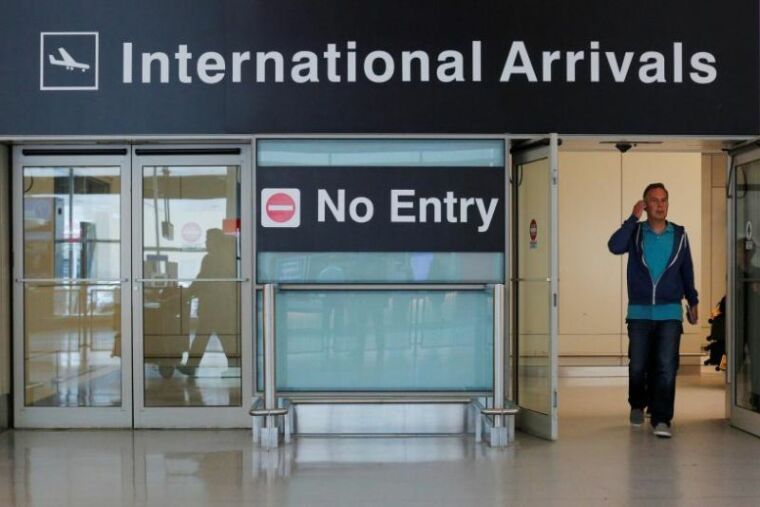Supreme court retains expanded list of exemptions from Trump travel ban

The U.S. Supreme Court has upheld a federal judge's decision to expand the list of relatives who are exempted in President Donald Trump's executive order banning visitors from six Muslim-majority countries.
Last week, U.S. District Judge Derrick Watson issued a ruling exempting grandparents and other relatives of U.S. citizens from Iran, Libya, Somalia, Sudan, Syria and Yemen from acquiring visas under the travel ban. He also ordered the government to allow refugees formally working with a U.S. resettlement agency to enter the country.
The Trump administration asked the high court last Friday to overturn Watson's ruling, which limited the scope of Trump's travel ban.
On Wednesday, the justices blocked Watson's order as it applies to refugees, but upheld the federal judge's expanded list of relatives.
According to The Associated Press, the Supreme Court decision affects 24,000 refugees who already have been assigned to a charity or religious organization in the U.S.
"This ruling jeopardizes the safety of thousands of people across the world including vulnerable families fleeing war and violence," said Naureen Shah, Amnesty International USA's senior director of campaigns.
The brief order stated that the court's decision is only temporary as the San Francisco-based Ninth U.S. Circuit Court of Appeals considers a separate case on the same issue.
The latest round in the fight over Trump's executive order began after the Supreme Court allowed the administration to partially reinstate the 90-day ban on travelers from six Muslim-majority countries and a 120-day ban on refugees from anywhere in the world.
The court's ruling had exempted people with a "bona fide relationship" with a person or an entity in the U.S., but the justices did not define those relationships.
The administration had narrowly interpreted the ruling, saying the ban would apply to grandparents and other family members, prompting the state of Hawaii to ask Watson to expand the definition of relatives who could be admitted to the country.
The exemption from the travel ban had previously applied only to parents, spouses, fiances, sons, daughters, sons-in-law, daughters-in-law or siblings. Watson added grandparents, grandchildren, brothers-in-law, sisters-in-law, aunts, uncles, nieces, nephews and cousins to the list of relatives that could be allowed to enter the U.S.
The State Department has already instructed diplomats to use the expanded list when considering visa applicants from the six countries.
Justices Samuel Alito, Neil Gorsuch and Clarence Thomas stated last month that they would have allowed the travel ban to take full effect, and the same three justices also would have blocked Watson's order in its entirety.
The Supreme Court announced that it has scheduled oral arguments regarding the lawfulness of the travel ban for Oct. 10, though the 90-day pause will have expired by that time.
 Christians don't have to affirm transgenderism, but they can’t express that view at work: tribunal
Christians don't have to affirm transgenderism, but they can’t express that view at work: tribunal Archaeology discovery: Medieval Christian prayer beads found on Holy Island
Archaeology discovery: Medieval Christian prayer beads found on Holy Island Presbyterian Church in America votes to leave National Association of Evangelicals
Presbyterian Church in America votes to leave National Association of Evangelicals Over 50 killed in 'vile and satanic' attack at Nigerian church on Pentecost Sunday
Over 50 killed in 'vile and satanic' attack at Nigerian church on Pentecost Sunday Ukrainian Orthodox Church severs ties with Moscow over Patriarch Kirill's support for Putin's war
Ukrainian Orthodox Church severs ties with Moscow over Patriarch Kirill's support for Putin's war Islamic State kills 20 Nigerian Christians as revenge for US airstrike
Islamic State kills 20 Nigerian Christians as revenge for US airstrike Man who served 33 years in prison for murder leads inmates to Christ
Man who served 33 years in prison for murder leads inmates to Christ


 Nigerian student beaten to death, body burned over ‘blasphemous’ WhatsApp message
Nigerian student beaten to death, body burned over ‘blasphemous’ WhatsApp message 'A new low': World reacts after Hong Kong arrests 90-year-old Cardinal Joseph Zen
'A new low': World reacts after Hong Kong arrests 90-year-old Cardinal Joseph Zen Iran sentences Christian man to 10 years in prison for hosting house church worship gathering
Iran sentences Christian man to 10 years in prison for hosting house church worship gathering French Guyana: Pastor shot dead, church set on fire after meeting delegation of Evangelicals
French Guyana: Pastor shot dead, church set on fire after meeting delegation of Evangelicals ‘Talking Jesus’ report finds only 6% of UK adults identify as practicing Christians
‘Talking Jesus’ report finds only 6% of UK adults identify as practicing Christians Mission Eurasia ministry center blown up in Ukraine, hundreds of Bibles destroyed: 'God will provide'
Mission Eurasia ministry center blown up in Ukraine, hundreds of Bibles destroyed: 'God will provide' Church holds service for first time after ISIS desecrated it 8 years ago
Church holds service for first time after ISIS desecrated it 8 years ago Burger King apologizes for 'offensive campaign' using Jesus' words at the Last Supper
Burger King apologizes for 'offensive campaign' using Jesus' words at the Last Supper Uganda: Muslims abduct teacher, burn him inside mosque for praying in Christ’s name
Uganda: Muslims abduct teacher, burn him inside mosque for praying in Christ’s name